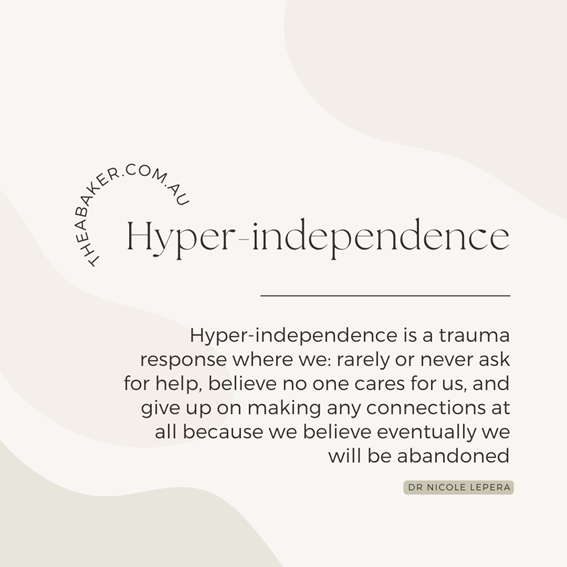Hyper-independence seen through a trauma lens
Hyper-independence seen through a trauma lens
In Australia, like many other westernised cultures, there is a strong focus on raising children to be independent and self-sufficient. This is a deliberate parenting approach because we place a lot of value on independence as being key to making and achieving school and career goals, building strong relationships beyond the family unit and maintain healthy living environments. However, when if become so fiercely independent (‘hyper-independent’) that we are unwilling to ask for help / support, even when that has significant and negative consequences for our mental and physical health.

So hyper-independence is more than being self-reliant. It’s more like an unwavering insistence on doing things alone. Hyper-independent people appear resistant and unwilling to depend on others – but they experience intense discomfort asking for help or allowing others to support them, even when they really need it. For hyper-independent people asking for help from others might feel inherently unsafe and / or they might simply not have the neural wiring (pathways) that give asking for help from others as an option. Essentially, for little people who didn’t have their core needs met (or whose needs were met in erratic and uncertain ways) hyper-independent people learned very early that they could only depend on themselves.
Hyper-independence and connection with trauma
Remembering that not everyone who experiences trauma will have the same response to that trauma, hyper-independence can come from the following sorts of experiences:
- “I am not deserving of others support or help” – this sort of negative belief emerges when we learn from early in our lives that it is not acceptable to need help or receive support.
- Neglect – either in the sese of physical or emotional needs not being met. When we experience neglect in this way, we learn that the only person we can rely on is ourselves. We might also learn that others cannot or will not help us so there’s no point in asking.
- Mistrust of others – where caregivers have shown themselves to be unreliable or abusive it can lead to a connection that asking for help = abusive response, which as we get older can mean avoiding asking for help.
- Coping with uncertainty – when we go through traumatic upbringings / events we also experience a lack of control. In this way, hyper-independence might emerge later as a means to regain control.

Signs of hyper-independence
- Over-achieving: over-commitment to work or projects to the point where they might even struggle to manage the load themselves.
- Guardedness in relationships: struggle to let others in and operate as a ‘team’ in relationships.
- Secretiveness: keeping to themselves, reluctant to share personal information that they fear might be used against them.
- Mistrust of others: worry that others will let them down, betray their trust, or abandon them.
- Few close / long-term relationships: it’s hard to form and maintain long-term friendships or romantic relationships when it’s hard to open up and rely on others.
- Stress / burnout: when struggling with delegating or asking for help, hyper-independent people often take on more than they can handle => burnout.
- Dislike of ‘neediness’: in-line with not liking to rely on others, hyper-independent people don’t like others relying on them, which can feel like ‘neediness’.
If you’d like to explore your own hyper-independent traits and would like a safe space to talk about your mental health, please get in touch with us: www.theabaker.com.au / hello@theabaker.com.au / 03 9077 8194.
